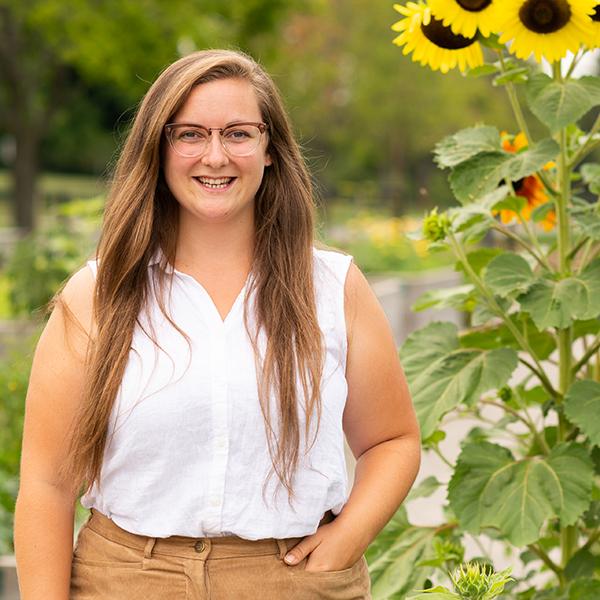
Alumni Spotlight

Alumni Spotlight
Ashley Packer ’16 began her career at Mohawk College with the Office of Campus Sustainability and Climate Change. Thinking it would only be a temporary position, it has grown into something so much more, not only for her professional life, but for her personal life as well.
The Office of Campus Sustainability and Climate Change focuses on eight areas: Waste, food, transportation, energy, building and development, participation and engagement, communication and reporting, and sustainable procurement. Each pillar contributes to making the college campus more sustainable.
Mohawk’s new net zero building, The Joyce Centre for Partnership & Innovation is a shining example of what is possible when you put sustainability first. Packer has been a part of some exciting projects on campus such as the campus community garden and the Mohawk College Farm Stand, but one of her most “tangible achievements“ is the introduction of honey bees to Fennell Campus. “After months of hard work, I’ve finalized the project and the bees arrived at Mohawk in August,” says Packer. “It’s both exciting and rewarding to know that we will support pollinators on campus, which in turn, support our food systems in the surrounding community.”
Packer is also involved in the college's Sustainability Initiatives Fund Idea campaign. Each year the campaign invites students to submit ideas on how Mohawk can enhance its sustainability efforts on campus. This past year the campaign resulted in 552 ideas submitted, engaging with over 3,000 students. The selected winners are awarded a cash prize, but more importantly, their ideas are implemented on campus, allowing them to see their projects come to life. “We really focus on explaining to students what sustainability means and hashing out their ideas together," says Packer.
Developing a Continuing Education course is yet another college initiative that Packer took part in. Local Food Procurement is an online professional development course geared towards industry professionals to enhance their local food knowledge and skills. “Through learning from experts and leading local food champions, the goal is to help people discover how to bring local food into their business,” says Packer.
Packer makes some interesting sustainable choices in her home as well—it is “exactly what you would expect it to be“ based on her passion for the environment.
It‘s energy efficient, has a pollinator and vegetable garden, and collects rainwater. Though she tries not to produce recycling, Packer does have a recycling station in her basement where she collects items that can be recycled properly through the city and through companies such as TerraCycle. When it comes to consumer purchases, Packer refuses to buy anything that can't be recycled, including black plastic, Styrofoam and coffee cups.
Getting the message of sustainability out is a challenge Packer faces daily. It can be tough getting people to care. She believes it’s what we’re born to do, “I look at this earth, and at ourselves and I see a give and take relationship.” She continues, “I think we’ve taken the back seat on our end and it’s showing. There’s a definite disconnect; a lot of times we act like we have more than one life like we have more than one earth. I think if you want to live your best life you need to start caring about the earth as much as you care about yourself. What you’ll begin to find, as I have myself, is that those decisions, for the earth and for us, are not mutually exclusive.”
With her love of education and talking to people, Ashley has gained a lot of experience spreading her joy for gardening and sustainability, and her future is looking bright. For anyone who is interested in adopting sustainable living practices, Ashley encourages them to begin by researching the topic. She says there are many easy and practical steps a person can take towards living sustainably, but with so much information available, it can feel overwhelming to take it all on at once. The solution? “Start by picking one thing—get good at it, then add another.”
By: Shanine Cook
This story was originally published in Fall 2018 in the Mohawk Alumni In Touch magazine.
When Témo Cruz enrolled in Mohawk College’s Architectural Technology Program, he never imagined it would introduce him to the world of shipping con
Mohawk alumnus Greg Gagnon has “it”. Expertise, character and passion that have led to two high esteemed awards.
After graduating from Mohawk College's Recreation and Leisure program, the world called, and Iuliana Raducanu answered.